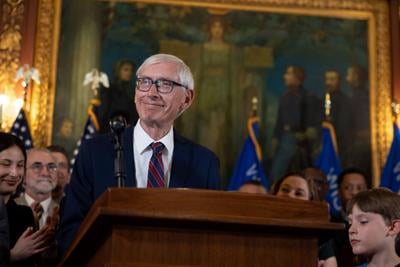The state’s top business group is asking the Wisconsin Supreme Court to overturn Gov. Tony Evers’ veto maneuver last summer to allow school districts to increase revenues for each of the next 400 years.
The move by Evers made headlines at the time for taking advantage of the sweeping line-item veto powers given to Wisconsin governors, which are routinely used when reviewing the biennial state budget document.
While the powers of the governor have been winnowed down over time, Evers was still able to ax 34 characters in the budget bill to allow school districts to increase the amount of money they can raise — either via state funding or by a local tax increase — by $325 per student each year until the 2425 school year.
A state revenue limit guides when a school district can ask local taxpayers to chip in more for funding and by how much.
Lawmakers approved the $325 increase, intending it to be a one-year move, but Evers and others have pushed for more to help districts struggling with rising costs.
The governor at the time said his veto revision was intended to give school districts “predictable long-term increases for the foreseeable future." His partial veto, and the subsequent funding increase, followed the previous two years of stagnant per-pupil revenue limits. Republicans had defended the frozen funding, saying that schools were receiving federal COVID-19 relief money at the time.
In a lawsuit filed Monday directly with the Wisconsin Supreme Court, the litigation arm of Wisconsin Manufacturers and Commerce is asking the justices to undo the partial veto, arguing it effectively forces local property taxpayers to pony up more money to fund schools.
“This action is not only unconstitutional on its face, but it is undemocratic because this specific partial veto allows school districts to raise property taxes for the next 400 years without voter approval,” Scott Rosenow, executive director of the WMC Litigation Center, wrote in a statement.
The lawsuit argues that the veto not only does an end-around legislators and local officials but also violates a 1990 amendment to the Wisconsin Constitution that said governors “may not create a new word by rejecting individual letters in the words of the enrolled bill.”
That amendment, as well as a subsequent 2008 constitutional amendment, were enacted by voters in response to Gov. Tommy Thompson’s use of the so-called “Vanna White veto” in the 1987 budget. Gov. Jim Doyle also raised eyebrows in 2005 when he moved $400 million in road funding to pay for schools using his veto powers.
“The partial veto at issue here is an unconstitutional ‘pick-a-letter’ veto, not a reduction of an appropriation,” the lawsuit, filed on behalf of two northeast Wisconsin taxpayers, said.
In Evers’ first term as governor, the state Supreme Court imposed some limits on the governor’s partial veto power, although justices were divided over how far those changes should ultimately go.
Throughout his time as governor, Evers has been heavily criticized by his Republican counterparts for his liberal use of the veto pen. Indeed, during the 2021-22 legislative session, Evers vetoed a record-breaking 126 bills — about 32% of the legislation transmitted to him by the Legislature, according to the Legislative Reference Bureau.
Evers’ office issued a statement rebuking the WMC lawsuit shortly after the complaint was filed.
“Republicans and their allies will stop at nothing to take away resources from our kids and our public schools,” Evers spokesperson Britt Cudaback posted to the social media platform X, formerly known as Twitter. “Republicans’ latest lawsuit aims to strip $300 from every student at every public school in Wisconsin every year for the foreseeable future even as millions of Wisconsinites are being forced to raise their own property taxes to help our schools make ends meet.”
Regardless of whether the lawsuit succeeds, Republican legislators have taken steps to make sure something like the 400-year veto doesn’t happen again.
A proposed constitutional amendment approved by Republican lawmakers earlier this year would block Wisconsin governors from using their line-item veto power to create, increase or authorize the creation or increase of a tax. The amendment will need to be approved in the Legislature again next year before it is presented to voters, who would decide whether to add it to the state Constitution






